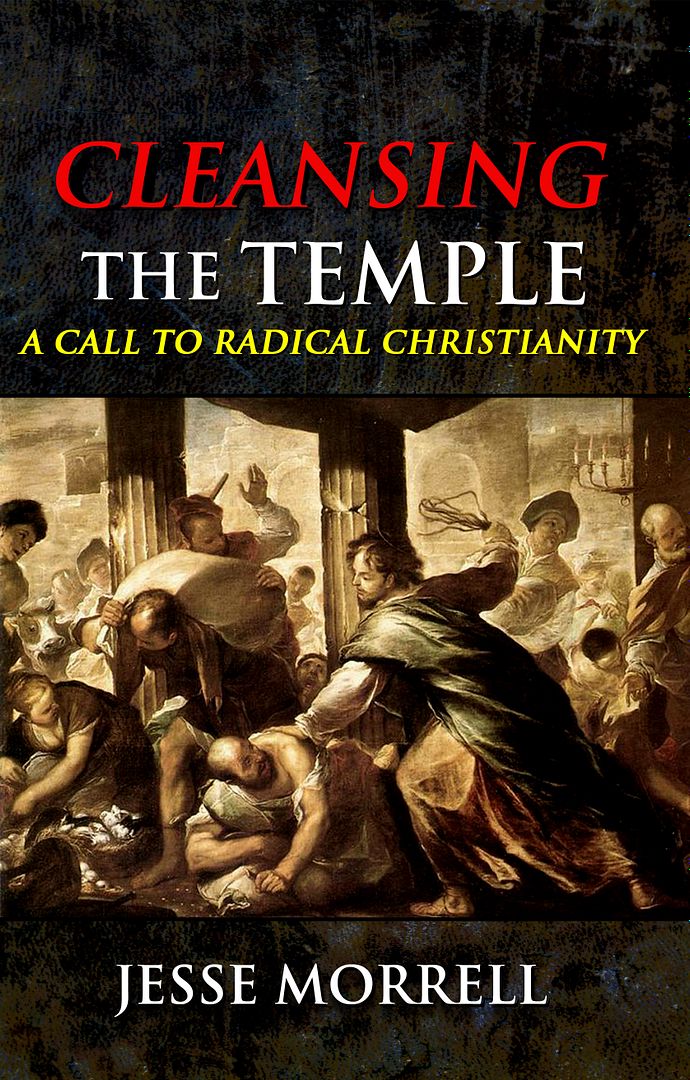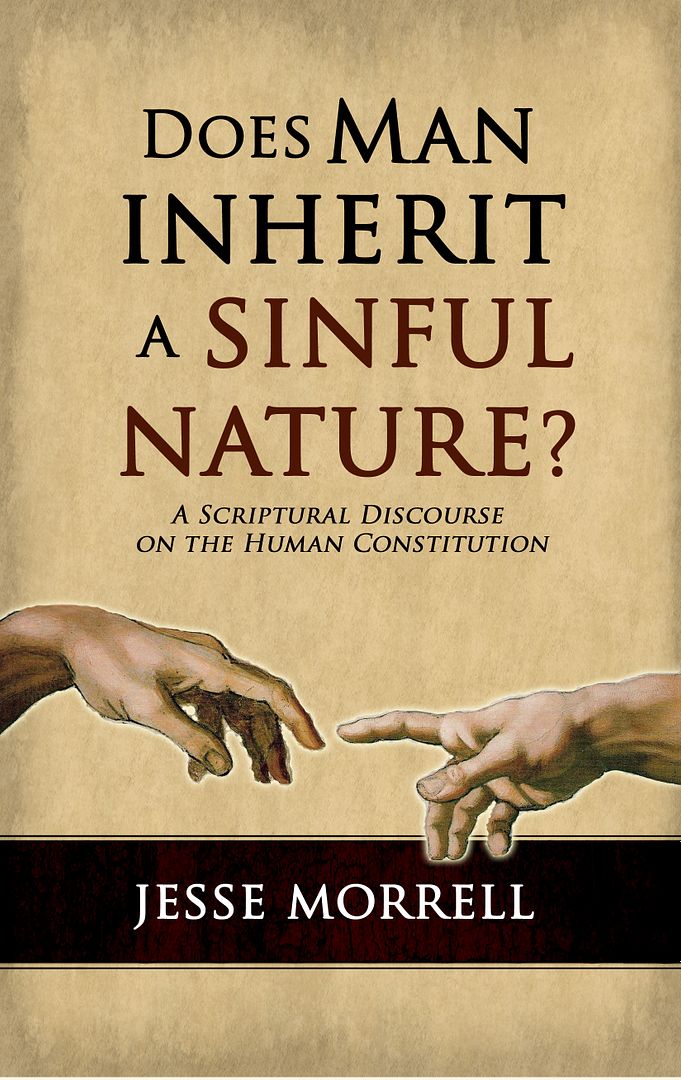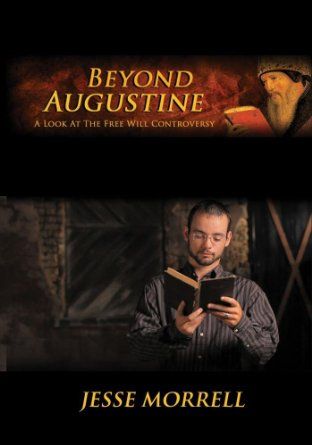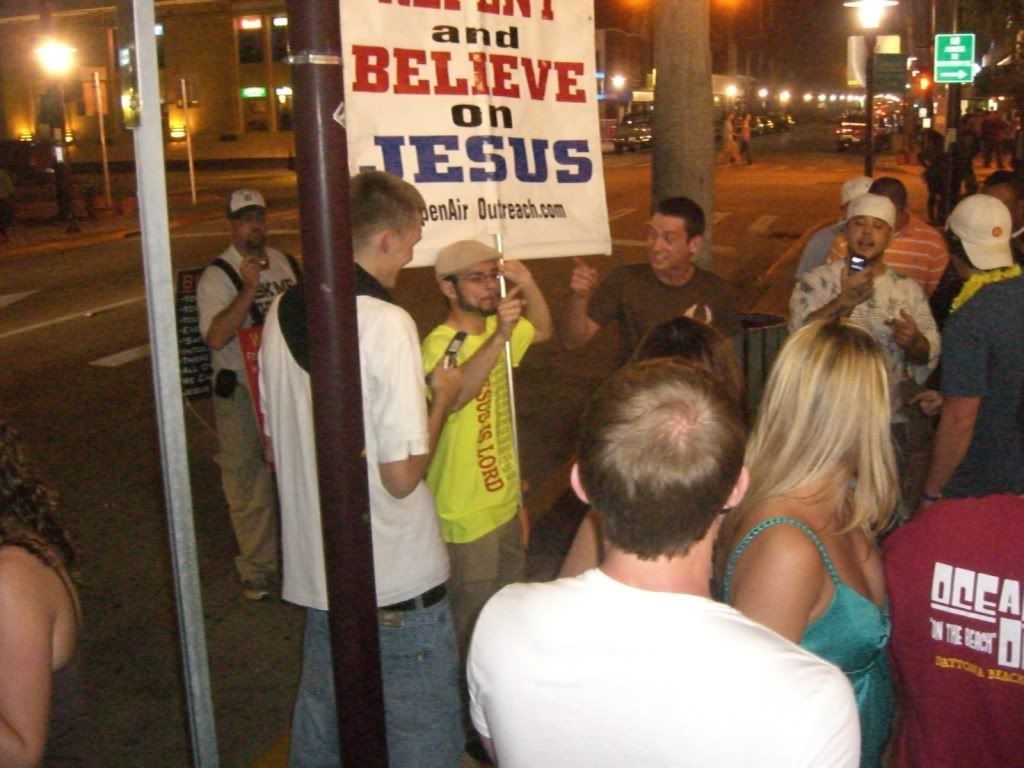

An excerpt from the book,
“The Natural Ability of Man:
A Study on Free Will & Human Nature” by Jesse Morrell
To Order: Click Here
Continuing or Falling Away is Man’s Choice
Man not only has the ability to embrace or reject the gospel before conversion, but man still has the ability to embrace or reject the gospel after conversion. Just as conversion is man’s choice, so also continuing in a converted state is man’s choice. The unconverted are capable of choosing to enter into a converted state and therefore, the converted are capable of leaving a converted state. Since conversion is not the removal of our free will, but is rather the redirecting of it, the possibility of backsliding remains.
Richard S. Taylor said, “Notice how confusing and self-contradictory it is to tell the sinner to repent, to act, as though he were partially responsible for his own salvation, then tell him that, once saved, he is eternally secure. It implies that man has responsibility before conversion but none after. It means that a person has ability to get into the kingdom but none to get out. It gives sinners a free moral agency, but denies it to Christians. A strange dilemma! Surely if a sinner is morally responsible to become saved he is just as morally responsible to remain saved. It is absurd to infer that conversion destroys freedom of the will, or marks the end of probation. Therefore in order to be logical we must affirm that if a sinner has a personal part to play in obtaining entrance into the kingdom, he also has ability to get out again, and if he has no ability to get out of the kingdom, then he has no personal ability whereby he may get in. In such case, why the need of warning, of exhorting sinners? of preaching at all? If it is entirely a matter of unconditional grace and divine sovereignty any of the time, then it is a matter of grace and sovereignty all the time; and if in any sense the individual is responsible for his salvation, then that responsibility is retained throughout the entire period of his probation.”42
After we have decided to come to Christ, we must choose to abide in Him. Salvation is attained by turning from sin and turning to Christ, and salvation is maintained by staying away from sin and abiding in Christ. A person gets saved through repentance and faith, and a person must stay saved through perseverance. Salvation is not permanent without perseverance.
There are many passages that teach that men must choose to abide in Christ, remain in the faith, and persevere in holiness to stay saved. And that if one does not continue in these, they will forfeit their salvation. The Bible says, “But he that shall endure unto the end, the same shall be saved” (Matt. 24:13). The one who will be finally saved is the one who must do the enduring. There are some who do not endure in Christ but have fallen away. “From that time many of his disciples went back, and walked no more with him” (Jn. 6:66). Instead of choosing to stay with Christ, they decided to go back and to leave Him. “Then said Jesus to the Jews which believed on him, if ye continue in my words, then are ye my disciples indeed…” (Jn. 8:31). The phrase “if ye continue” implies that you may not continue. Continuation in Christ is not a guarantee or a certainty. The reason that Jesus told men “if ye continue” is because it is they themselves who must do the continuing. It is their free choice. Jesus didn’t say that He would preserve them, but that they needed to persevere. Jesus taught, “If a man abide not in me, he is cast forth as a branch, and is withered, and men gather them, and cast them into the fire, and they are burned” (Jn. 15:6). In other words, you must choose to stay in Christ in order to stay saved.
This is why Paul “exhorted them all, that with purpose of heart they would cleave unto the Lord” (Acts 11:23). To stay with the Lord requires the determination of our own heart. That is why Paul also “persuaded them to continue in the grace of God” (Acts 13:43). If staying in the grace of God was not their choice, or was an unavoidable certainty, there would be no need for Paul to persuade them. They need to be persuaded to continue in God’s grace only if continuing in God’s grace is their choice, and if it is an avoidable choice. “Confirming the souls of the disciples, and exhorting them to continue in the faith, and that we must through much tribulation enter into the kingdom of God” (Acts 14:22). The only reason you would need to exhort a person to stay in the faith is if staying in the faith was their choice and if they could choose not to continue in the faith.
Paul said, “And you that were sometimes alienated and enemies in your mind by wicked works, yet now hath he reconciled in the body of his flesh through death, to present you holy and unblameable and unreproveable in his sight: If ye continue in the faith grounded and settled, and be not moved away from the hope of the gospel, which ye have heard, and which was preached to every creature which is under heaven…(Col. 1:21-23)
Falling away from the faith is warned about all throughout the Bible, and the objective of warning is that the one who is being warned might make the right choice. Since Paul warned Christians about falling away from Christ, this assumes that abiding in Christ is their own choice and that it is a choice which they may or may not make.
The possibility of falling away from the faith is what Paul warned about when he said, “Well; because of unbelief they were broken off, and thou standest by faith. Be not highminded, but fear: for if God spared not the natural branches, take heed lest he also spare not thee. Behold therefore the goodness and the severity of God: on them which feel, severity; but toward thee, goodness, if thou continue in his goodness: otherwise thou also shalt be cut off” (Rom. 11:20-21).
With such an abundantly clear teaching in Scripture, it is amazing that men like Charles Stanley would say that “believers who lose or abandon their faith will retain their salvation…”43 The Bible teaches that we must choose to believe in order to get saved, and that we must choose to continue in the faith in order to stay saved. As Paul said, “because of unbelief they were broken off, and thou standest by faith.” If a believers forsakes the faith and turns to atheism, Hinduism, Buddhism, Mormonism, Islam, or any other faith, they do not “retain their salvation” as men like Charles Stanley dream but are “broken off” from the life that is in Christ.
Just as the Bible teaches that our own choice and role is necessary in getting saved, so it also teaches that our own decision and activity is necessary in order to stay saved. Paul said, “But I keep under my body, and bring it into subjection: lest that by any means, when I have preached to others, I myself should be a castaway” (1 Cor. 9:27). In other words, if Paul did not keep his body under subjection, he himself would become a reprobate! If even the Apostle Paul said that he was capable of losing his salvation, then anyone can lose their salvation!
That is why Paul warned believers, “For if ye live after the flesh, ye shall die: but if ye through the Spirit do mortify the deeds of the body, ye shall live” (Rom. 8:13). Whether we live after the flesh and die, or if we mortify the deeds of the body and live, is a matter of our own free choice. Whether we live or die depends on our decision. Paul was saying that we ourselves must do something to stay saved.
That staying saved required our own choice, or that we must do something to retain or maintain our salvation, was a repeated topic and truth for the Apostle Paul. He taught that remaining in the faith is the responsibility of the Christian, so that it depends upon us.
Paul said, “Wherefore let him that thinketh he standeth take heed lest he fall” (1 Cor. 10:12);
“Moreover, brethren, I declare unto you the gospel which I preached unto you, which also ye have received, and wherein ye stand; by which also ye are saved, if ye keep in memory what I preached unto you, unless ye have believed in vain” (1 Cor. 15:1-2);
“We then, as workers together with God, beseech you also that ye receive not the grace of God in vain” (2 Cor. 6:1);
“For now we live, if ye stand fast in the Lord” (1 Thes. 3:8);
“Take heed unto thyself, and unto the doctrine; continue in them: for in doing this thou salt both save thyself and them that hear thee” (1 Tim. 4:16);
“Therefore we ought to give more earnest heed to the things which we have heard, lest at any time we should let them slip. For if the word spoken by angels was stedfast and every transgression and disobedience received a just recompense of reward; how shall we escape, if we neglect so great salvation (Heb. 2:1-3);
“But Christ as a son over his own house; whose house are we, if we hold fast the confidence and the rejoicing of the hope firm unto the end” (Heb. 3:6);
“Take heed, brethren, lest there be in any of you an evil heart of unbelief, in departing from the living God. But exhort one another daily, while it is called today; lest any of you be hardened through the deceitfulness of sin. For we are made partakers of Christ, if we hold the beginning of our confidence stedfast unto the end” (Heb. 3:12-14);
“Let us labour therefore to enter into the rest, lest any man fall after the same example of unbelief” (Heb. 4:11);
“Seeing then that we have a great high priest that is passed into the heavens, Jesus the Son of God, let us hold fast our profession” (Heb. 4:14);
“Let us draw near with a true heart in full assurance of faith, having our hearts sprinkled from an evil conscience, and our bodies washed with pure water. Let us hold fast the profession of our faith without wavering…” (Heb. 10:22- 23);
“And to Jesus the mediator of the new covenant, and to the blood of sprinkling, that speaketh better things than that of Abel. See that ye refuse not him that speaketh. For if they escaped not who refused him that spake on the earth, much more shall not we escape, if we turn away from him that speaketh from heaven” (Heb. 12:24-25).
The Bible does not teach that once a person is saved, they are always saved. Jesus spoke of those who “receive the word” and “for a while believe” but “in time of temptation fall away” (Lk. 8:13). You cannot fall away from the faith unless you were, at one point, actually in the faith.
Jesus also spoke of the servant who was forgiven of his debt but then later, because of his conduct, had his pardon revoked, had his debt reinstated, and was punished (Matt. 18:23-35). This shows that just because God has forgiven us does not mean that He cannot take his forgiveness back and hold us liable for our actions. This parable shows that those who were once forgiven can still be punished later and that those who are punished may have been, at one point, forgiven. There are souls in hell that, at one point, might have been genuinely saved.
The Bible repeatedly teaches that those who have been once saved can afterward fall away. The Bible says, “For if we sin willfully after that we have received the knowledge of the truth, there remaineth no more sacrifice for sins, but a certain fearful looking for of judgment and fiery indignation, which shall devour the adversaries. He that despised Moses law died without mercy under two or three witnesses: Of how much sorer punishment, suppose ye, shall he be thought worthy, who hath trodden under foot the Son of God, and hath counted the blood of the covenant, wherewith he was sanctified, an unholy thing, and hath done despite unto the Spirit of grace? For we know him that hath said, Vengeance belongeth unto me, I will recompense, saith the Lord. And again, The Lord shall judge his people. It is a fearful thing to fall into the hands of the living God” (Heb. 10:26-31).
“Brethren, if any of you do err from the truth, and one convert him; let him know that he which converteth the sinner from the error of his way shall save a soul from death, and shall hide a multitude of sins” (Jas. 5:19-20).
“For if after they have escaped the pollutions of the world through the knowledge of the Lord and Saviour Jesus Christ, they are again entangled therein, and overcome, the latter end is worse with them than the beginning. For it had been better for them not to have known the way of righteousness than, after they have known it, to turn from the holy commandment delivered unto them (2 Pet. 2:20-21).
“Ye therefore beloved, seeing ye know these things before, beware lest ye also, being led away with the error of the wicked, fall from your own stedfastness” (2 Pet. 3:17).
“Let that therefore abide in you, which ye have heard from the beginning. If that which ye have heard from the beginning remain in you, ye also shall continue in the Son, and in the Father” (1 Jn. 2:24).
“Whosoever transgresseth, and abideth not in the doctrine of Christ, hath not God. He that abideth in the doctrine of Christ, he hath both the Father and the Son” (2 Jn. 1:9).
Dan Corner said, “There is still the free will of the individual and his personal responsibility that are involved after salvation. If these weren’t a consideration, then no Christian would ever fall into sin or stray off into false doctrine, since God will always do his part perfectly!”44 If salvation were by irresistible grace or a divine monergism as Calvinists claim, then falling away would not be a possibility and you would expect a person to always be obedient to God after conversion. Yet we see that even after some men were genuinely converted, they fell into gross sin and some even departed from the faith completely. What does this reveal but the truth of free will?
We know that after God gave Saul “another heart” (1 Sam. 10:9), and after “the Spirit of God came upon him” (1 Sam. 10:10), that he made the choice to sin against God (1 Sam. 15:19-35). Saul did not lose his free will ability to sin when he received a new heart and received the Spirit of God.
King David was a man after God’s own heart (1 Sam. 14:13), yet after this we know that king David sinned (2 Sam. 12:13). We can clearly see that those who are righteous are still free to become wicked, just as those who are wicked are free to become righteous. “The righteous” have the freedom or ability to “turneth from his righteousness” and “the wicked” have the freedom or ability to “turn from his wickedness” (Eze. 3:20; 18:26-27; 33:18-19).
We also have the examples of Peter and Judas. Both Peter and Judas were disciples of the Lord. Therefore, they both left all to follow Jesus (Lk. 14:33). They both picked up their cross (Lk. 14:27) and even loved Jesus more than their own family (Lk. 14:26).
Judas and Peter were both picked by Jesus specifically to cast out devils, heal the sick, and preach the gospel (Matt 10:1-27). No doubt Jesus would not pick unsaved men for such a task! Jesus put his public approval upon these men when he picked them to be His Apostles and commissioned them to preach His gospel.
Jesus even said that Judas’ and Peter’s names were written in the Lambs book of life (Lk. 10:20), that they were one of His sheep (Matt. 10:1-4, 16), that they had received His truth (Matt 10:1-4, 8), that their Father was God (Matt 10:1-4, 20), and that they both had a throne in Heaven upon which they would judge Israel (Matt. 19:28; Lk. 22:30). Yet, at one point, Jesus called Judas a “devil” (Jn. 6:70) and even called Peter “Satan” (Matt. 16:23).
Peter came to deny the Lord three times (Matt. 26:34). Peter was in danger of going to hell because Jesus had warned “Whosoever therefore shall be ashamed of me and of my words in this adulterous and sinful generation; of him also shall the Son of man be ashamed, when he cometh in the glory of his Father with the holy angels” (Mk. 8:38). And Jesus also said, “But whosoever shall deny me before men, him will I also deny before my Father which is in heaven” (Matt. 10:33). If Peter had died in his sin, Jesus Christ would have been ashamed of him before all of Heaven and would have publicly denied him.
The fact that Jesus said to Peter “Satan hath desired to have you, that he may sift you as wheat… when thou art converted, strength thy brethren” (Lk. 22:31-32) shows that Peter was no longer saved during his denial of Christ. The good news is that Peter had repented of his sin and was restored to Jesus Christ. Three times Peter denied Christ, so three times Christ asked Peter if He loved him (Jn. 21:15- 17), thus restoring him from his backsliding.
Like Peter, Judas also decided to backslide from faithful devotion to Jesus. Judas began to steal money from the group (Jn. 12:6) and he even came to betray the Lord (Mk. 14:10). Jesus knew from the very beginning of Judas’ plot that he would betray Him (Jn. 6:64). But the Bible says that Judas was, at one point, a trusted friend of Jesus (Ps. 41:9; Jn 13:18). This explains why Judas kept the money (Jn 13:29). If Jesus trusted Judas as a friend, Judas must have been trust worthy at that time. Betrayal implies, presupposes, or takes for granted former loyalty, friendship, or trust. If Judas was not formerly a loyal and trust friend of Jesus, he could not have betrayed Him. If Judas was not a loyal and trusted friend, who was a genuine follower of Him, He would not have chosen Him to preach the gospel, heal the sick, or cast out devils in the first place.
Judas became a devil (Jn. 6:70), but he was not always a devil, for Jesus asked, “How can Satan cast out Satan?” (Mk. 3:23).
Dan Corner said, “Judas was once a saved man who preached the gospel, healed the sick, and then went astray and ended up in eternal fire…”45 John Fletcher said, “Judas was sincere, when Christ chose him to the apostleship.”46 Chrysostom said, “Judas was at first a child of the kingdom and heard it said to him with the disciples, ‘You shall sit upon twelve thrones’ but at last he became a child of hell…”47 Ambrose said, “For both Saul and Judas were once good…Sometimes they are at first good, who afterward become and continue evil; and for this respect they are said to be written in the book of life, and blotted out of it.”48
Through his transgression, Judas fell from his apostleship (Acts 1:25). Even though Jesus told Judas that He was shedding His blood for him (Lk. 22:14-20), in the end, it would have been better for him to have never been born (Mk. 14:21). Judas lost his apostleship and lost his salvation because he sinned and was not restored through repentance as Peter was.
Calvinists, on the other hand, have taught that Judas was not saved but was “doomed to destruction to fulfill the Scriptures.” The only actual prophecy about Judas are the one’s given by Christ, which He gave shortly before the betrayal occurred, after He saw these events unfolding (Mk. 26:21). It is worth noting that there was absolutely no Old Testament prophecy about Judas at all which he had to fulfill. Not a single Old Testament prophecy ever mentioned Judas or Christ’s betrayal.
Usually Acts 1:16 is referred to in an attempt to say otherwise, but a closer examination reveals that this is not the case. “Men and brethren, this Scripture must needs have been fulfilled, which the Holy Ghost by the mouth of David spake before concerning Judas, which was guide to them that took Jesus” (Acts 1:16). And what Scripture needs to be fulfilled? That somebody needed to betray Jesus? No! Peter said, “For it is written in the book of Psalms, let his habituation be desolate, and let no man dwell therein: and his brishoprick let another take” (Acts 1:20). This was no prophecy about Judas’ betrayal that needed to be fulfilled. The Scripture that Peter said needed to be fulfilled was that somebody need to take Judas’ place. Therefore, “Matthias… was numbered with the eleven apostles” (Acts 1:26).
The Scripture Peter referred to was not a prophecy about Judas, as the original passages speak in the plural but Peter modified them to the singular. Ps. 69:25 says let “their habituation” be desolate, but Peter changes it to “his habituation…” It says “let none dwell in their tents…” Peter was not quoting from a prophecy about Judas, since he had to change the passage to apply it to Judas, and since he was actually merging two difference Scriptures together. He referenced Ps. 69:25 about his habituation being desolate, and referenced Ps. 109:8 about another taking his office. Peter merged these two verses together and applied them to the current situation because there was a vacancy amongst the apostles that needed to be fulfilled.
What needs to be understood is that in Hebrew culture, they applied Scriptures to applicable situations just as a Christian might use a Psalm to describe their day, an experience they are going through, or to describe how they are feeling. The Hebrews used the Scriptures in the same manner. The Scriptures were indeed “fulfilled” in these situations, but not prophetically. They were fulfilled through parallelism. Scriptures were “fulfilled” by Judas through similarity or applicability.
These are known as “analogous fulfillments.” Hebrew writers would take Old Testament passages, which were specifically about Old Testament events, and apply them to New Testament events because of similarity. This is done by the Hebrew writer Matthew who applied Hos. 11:1 which talked about God calling Israel out of Egypt and he applies it to Jesus Christ in Matt. 2:15. Jesus also applied Ps. 41:9, which was talking about David’s betrayal by his trusted friend and counselor Ahithephel, and applied it to his own situation with Judas in Jn. 13:18.
It was not that these New Testament events were prophetic fulfillments of these Old Testament passages, but that these events did fulfill these passages through similarity or applicability. Another example is how Matthew applies the passage of thirty pieces of silver which is found in Zech. 11:12-13 and applies it to Judas’ betrayal in Matt. 27:9, when the original passage has nothing to do with Judas or the betrayal of Christ.
Jesus, as a Hebrew, used the Scriptures the same way. Jesus Christ said, “While I was with them in the world, I kept them in thy name: those that thou gavest me I have kept, and none of them is lost but the son of perdition; that the Scripture might be fulfilled” (Jn. 17:12). Jesus did not say which Scripture it was that was fulfilled, but we know that since there were no prophetic passages regarding Judas in the Old Testament, the Scriptural fulfillment Jesus referred to must have been that of fulfillment through similarity or applicability.
Regarding the phrase “that it might be fulfilled,” Dr. S. T. Bloomfield said that “this Scriptural expression sometimes means that such a thing so happened that this or that passage would appear quite suitable or applicable to it…”49 Moses Stuart said that “the New Testament writers often used Old Testament phraseology, which originally was applied in a very different connection. And they do this because such phraseology expresses, in an apt and forcible manner, the thought which they desired then to convey.”50 Dr. Edward Robinson said, “The phrase is often used to express historical or typical parallelisms.”51
These type of passages are known as ecbatic as opposed to telic. L. D. McCabe explained the difference. He said, “The telic use implies purpose, determination, prediction, and foreordination, while the ecbatic use implies only consequence, parallelism, application, or mere illustration.”52 The betrayal of Judas was not therefore a foreordained event which was necessary in order to fulfill prophecy, but Judas’ betrayal was his own free choice which fulfilled Scripture through parallelism.
As already shown, the Scriptures plainly teach that Judas was a genuine disciple or follower of Christ who fell from his apostleship and lost his salvation through his sin. To teach otherwise is to simply misrepresent or misunderstand the Scriptures. Jesus Himself said that the Father gave Judas to Him but that He had lost him (Jn. 17:12). Judas chose to be a disciple (Lk. 9:23; 14:27), then Jesus chose him to be an apostle (Lk. 6:13; Jn. 6:70), but then Judas fell from his apostleship by his choice to transgress (Acts 1:25). Judas lost both his salvation and apostleship through sin.
As the Bible says, “He that keepeth the commandment keepeth his own soul; but he that despiseth his ways shall die” (Prov. 19:16). Paul said that if a believer violates their conscience, even by simply eating meat offered to idols when they believe it is wrong, that
they commit “sin” and are therefore “damned” (Rom. 14:23). If a person chooses to do something which they believe is wrong in their conscience, even if it isn’t wrong, it shows that their heart isn’t right with God. They have a disobedient and rebellious will toward God.
Whenever a man does what He knows or believes is wrong, His own conscience condemns Him. And if our own heart condemns us because we are in conscious rebellion, how much more does God condemn us because He is greater than our hearts and knows all things (1 Jn. 3:20).
That is why Paul said that those believers who do what they believe to be wrong are in danger of being among those who “perish” (1 Cor. 8:11). What can we conclude from this but that a believer can in fact lose their salvation through sin? Paul was clearly teaching that those who are saved can still become damned and those with eternal life can still perish, if they choose to sin and become sinful in their hearts.
If salvation cannot be lost through sin, salvation is undeniably a license to sin. What is a license but permission to do a certain action with impunity? To have a license to sin is to be able to sin without fear of punishment. Therefore, if salvation cannot be lost through sin, or if a believer’s soul cannot be damned for sin, then a believer has a license to sin. Only if we are still liable to punishment, or subject to penalty, can it be said that we do not have a license to sin.
While I was on the University of West Florida in Pensacola open air preaching, a student in the crowd said that God’s grace and forgiveness in Christ was literally a license to sin and that we can sin every day without fear of hell. I responded by saying, “You lose your salvation every time that you sin.” This is why you must repent every time that you sin.
But there are those, like this man named Bray, who falsely teaches that “A Christian who commits sin certainly does not lose his salvation…”53 You cannot trust your wives or daughters around men who believe like that! While a friend of mine was preaching on East Carolina University in Greensville, NC, a local pastor also came out to the campus to open air preach the same day he was there. However, unlike what my friend preached, this pastor preached that even if a Christian were to rape a woman he would not lose his salvation! You certainly wouldn’t want your wife or daughters to go to his church!
The Bible, in opposition to what that pastor said, warns that those who sin will be blotted out of God’s book but those who overcome will not be blotted out. “And the Lord said unto Moses, whosoever hath sinned against me, him will I blot out of my book” (Exo. 32:33). “He that overcometh, the same shall be clothed in white raiment; and I will not blot out his name out of the book of life, but I will confess his name before my Father, and before his angels” (Rev. 3:5). The man who stays saved is the one who overcomes sin, rather than being overcome by sin.
Paul said, “What shall we say then? Shall we sin, because we are not under law, but under grace? God forbid!” (Rom. 6:15). In commenting on this passage, Pelagius said, “If you sin, you will not be under grace… If you wish to be in the service of sins, you will begin to subject yourself to the judgment of the law, which exacts punishment against sinners: but if you obey righteousness, you are not under the law, but under grace.”54
Who is it that receives the mercy of God? It is those who turn away from their
sins (Isa. 55:7; Prov. 28:13; Acts 8:22). Who is it that receives the wrath of God? It is those who remain in their sins (Rom. 1:18; 2:5; 2:8-9; Eph. 5:6; Col. 3:6). Anyone who is sinning is under the wrath of God because the wrath of God is impartial (Ex. 32:33; Deut. 10:17; Rom. 2:8-9; 2 Cor. 10:6; Col. 3:25; 2 Pet. 1:17; 1 Jn. 3:15; Rev. 21:8; 22:15). Even if a believer returns to his sins, after he has repented of his sins, he is returning to the wrath of God. The Bible says that “the wrath of God” “commeth” “upon the children of disobedience. Be not ye therefore partakers with them” (Eph. 5:6-7). Because the wrath of God is coming upon the disobedient, we should not be partakers with them in their disobedience, lest we too partake of the wrath of God.
While there can be no doubt that men are not saved by the merit of their obedience, there can also be no doubt that men are damned by the demerit of their disobedience. We are not made right with God by earning it through our obedience to Him, but at the same time, we are not right with God while we are in disobedience to Him. The Bible says, “For the wrath of God is revealed from heaven against all ungoldiness and unrighteousness of men” (Rom. 1:18), and the Bible says, “indignation and wrath, tribulation and anguish, upon every soul of man that doeth evil” (Rom. 2:8- 9). Paul even warned believers, “But after thy hardness and impenitent heart treasurest up unto thyself wrath” (Rom. 2:5). If a believer sins and does not repent, but instead have an impenitent heart, they are storing up the wrath of God.
Consider the warnings the Bible gives against “whosoever.” The Bible says “whosoever” will be in danger of hell if they break the commandments and teach others to do so (Matt. 5:19); if they are angry with a brother without cause or calls them a fool (Matt. 5:22); if they commit adultery by looking with lust (Matt. 5:28); if they publicly deny Jesus Christ (Matt. 10:33); if they blaspheme the Holy Spirit (Matt. 12:32); if they seek to save their life (Matt. 16:25); if they cause little children to stumble (Mk. 9:42); if they commit sin (Jn. 8:34-35); if they judge others in hypocrisy (Rom. 2:1); if they resist lawful government (Rom. 13:2); if they try to earn their salvation by their works (Gal. 5:4); if they are a friend of the world (Jas. 4:4); if they hate their brother (1 Jn. 3:15); if they do not abide in Christ and in His doctrine (2 Jn. 1:9); and if they love or make lies (Rev. 22:15). These passages do not warn “unbelievers” only, but specifically warns “whosoever” which means everyone.
This is why God chastens us if we are disobedient, so that we would not perish with the world. Paul said that “we are chastened of the Lord, that we should not be condemned with the world” (1 Cor. 11:32). This implies that if He did not chasten us, or if we did not listen to the chastening, we would in fact perish with the world. Make no mistake about it; it is possible for us to be condemned with the world if we do not heed the chastening of the Lord!
Someone might object and ask “Doesn’t God forgive us of our past, present, and future sins when we are converted?” The answer is no, as that would amount to a license to sin. God grants amnesty, clemency, or pardon through Christ’s blood for our past sins (Rom. 3:25; 2 Pet. 1:9), but He does not grant immunity or impunity for future sins (Jer. 7:10; Matt. 18:25-35; Rom. 6:1-2; 18:13; Heb. 10:26-31; Jud. 1:4). You cannot be forgiven in advance because you cannot be forgiven without repentance, and because you cannot be forgiven of that which you are not yet even guilty of!
When we repent, we are forgiven of all the sins that we are guilty of, but we do not have permission to continue in sin. If we sin, we can repent (Lk. 13:3; Jas. 5:19-20) and seek forgiveness (Matt. 6:12; 1 Jn. 1:9). In this way we can be restored (Ps. 51:9; Jer. 3:22; 4:1; Lk. 15:20; 22:32; Rom. 11:23; Jas. 5:19-20). A sinner gains salvation through conversion, a believer retains salvation through perseverance, and a backslider regains salvation through repentance. But if a believer returns to his sins and does not repent and seek forgiveness, they remain in a condemned state under God.
Only the narrow road leads to life while the broad road leads to destruction (Matt. 7:13-14). Therefore, those who forsake the narrow road and are once again walking on the broad road are no longer heading for life but are once again heading for destruction, unless they forsake the broad road and return to the narrow way. You will not find the destination of life if you abandon the road that leads there, and you will not avoid the destination of destruction if you continue to walk on the road the ends up there.
Someone might say, “But I thought that there was now no condemnation to them which are in Christ Jesus?” Yes, but you cannot cut a verse in half. There are qualifications as to who is in Christ and who has no condemnation. The rest of the verse says, “…who walk not after the flesh, but after the Spirit” (Rom. 8:1). This qualification makes a tremendous difference. If we are producing the fruits of the Spirit, we have no need to feel condemned since “against such there is no law” (Gal. 5:23), but if we are producing the works of the flesh, we ought to feel condemned because those who do such things will not inherit the kingdom of God (Gal. 5:19-21).
Charles Finney said that “there is no condemnation to those whose faith secures in them, an actual conformity to the divine will. To all others, there is.”55 He also said, “There can scarcely be a more dangerous error than to say, that while we are conscious of present sin, we are or can be in a state of acceptance with God.”56 If a believer sins, they should not feel safe and secure as if they are right with God, but they should feel condemned and fear for their soul! Those who repent of their sins and persevere in the faith are secure and safe, but those who return to their sins or who depart from the faith ought to feel insecure because they are in grave danger. They should repent and ask God for forgiveness.
Which believer has never asked God for forgiveness since first coming to Christ? All of us probably have. But whenever a person confesses their sin, repents of their sin, and ask for forgiveness for their sin, they are assuming that they are not already forgiven. Charles Finney said, “…if Christians are not condemned when they sin, they cannot be forgiven, for forgiveness is nothing else than setting aside the penalty. And therefore, if they are not condemned, they cannot properly pray for forgiveness. In fact, it is unbelief in them to do so.”57 Jesus actually taught us to pray in such a way as to take for granted that we are not forgiven of present or future sins. If a believer sins we are taught to pray “forgive us our debts” (Matt. 6:12). This implies that they are not already forgiven.
The Scriptures teach that sins are not forgiven in advance but must be forgiven through repentance as they occur; otherwise God has given us a license to sin. If we can now sin with impunity and immunity, or be forgiven while we continue to sin, than salvation is nothing more than having a license to sin and grace is the accomplice of iniquity.
Gordon C. Olson said that “man must repent and stop the flow of sin in order to be brought to the point where he is not under condemnation… If God forgave sin apart from repentance, man would be in the predicament of continuing ‘in sin that grace might increase’ (Rom. 6:1)… The Bible says nothing about the forgiveness of present or future sins, and everywhere implies, what our common sense affirms, that all sin brings condemnation and must be repented of and confessed before forgiveness can take place through faith in the atonement. We must repent, then, to be free from guilt and condemnation.”58
Martin Luther, on the other hand, seemed to teach that Christ has given us a license to sin when he said, “Be a sinner and sin boldly… No sin can separate us from Him, even if we were to kill or commit adultery thousands of times each day.”59
Contrary to what Luther said, Jesus Christ taught, “But if that evil servant shall say in his heart, my lord delayeth his coming; and shall begin to smite his fellow servants, and to eat and drink with the drunken; the Lord of that servant shall come in a day when he looketh not for him, and in an hour that is not aware of, and shall cut him asunder, and appoint him his portion with the hypocrites: there shall be weeping and gnashing of teeth” (Matt. 24:49- 51). The servants of the Lord Jesus Christ have not received a license to sin. Our master does not tell us that we are “eternally secure” or “once saved, always saved” while we continue to sin, but rather teaches that we are insecure or in grave danger whenever we find ourselves in wickedness.
Some Calvinists have thought that the Bible teaches unconditional eternal security because the Bible says, “ye were sealed with the Holy Spirit of promise” (Eph. 1:13). But a seal can be broken. That is why the Bible says, “And grieve not the Holy Spirit of God, whereby ye are sealed unto the day of redemption” (Eph. 2:30). Since the Holy Spirit is our seal, we must not grieve Him. It is the Holy Spirit that leads us and guides us in the faith, so if we grieve away the Holy Spirit through sin and unbelief, our situation is hopeless.
Calvinists also have appealed to Paul’s statement to the Philippians to teach that “the perseverance of the saints” is a guarantee. Paul said, “being confident of this very thing, that he which hath begun a good work in you will perform it until the day of Jesus Christ” (Php. 1:6). Paul was saying that he was confident in the Philippians because they were facing persecutions and were overcoming. Paul did not have this confidence for all believers. He said to the Galatians, “I marvel that ye are so soon removed from him that called you into the grace of Christ unto another gospel” (Gal. 1:6). Paul did not express to the Galatians the same confidence that he expressed to the Philippians. To take what Paul said to a specific Church in a specific situation, “that he which hath begun a good work in you will perform it until the day of Jesus Christ,” and apply it to all believers in all situations, is to misunderstand and misuse this text.
Calvinists also will appeal to the book of life for unconditional eternal security. They think that the elect, or the saved, have their names safely and securely written in the book of life even before they are saved, even before the creation of the world! But the names that have been “written in the book of life from the foundation of the world” (Rev. 13:8; 17:8), does not mean that the book of life was completed and finalized before creation as they have mistakenly assumed. The Greek word “from” actually means “since,”60 as it refers to a “distance of time.”61 It means that the book of life has been in the process of being written over a “distance of time,” or specifically “since” the foundation of the world. It was started
in Genesis and is completed in Revelation. Those persons whose names are not in the
book of life by the end will be cast into hell and will not inherit the kingdom of God
(Rev. 20:15).
It was not that all who are going to be saved is already determined or presently
certain. This explains how being blotted out of the book of life is a real possibility (Exo. 32:32-33; Deut. 29:20; Ps. 62:20; Rev. 3:5). The book of life is not complete or finalized right now if names are being removed from it or if names can still be erased. The book of life is in the process of being written and edited as the future is in the process of unfolding, developing, and changing. Therefore, the book of life is no grounds to affirm unconditional eternal security.
The words of Jesus have also been appealed to for “once saved, always saved” when He said, “My sheep hear my voice, and I know them, and they follow me: And I will give unto them eternal life; and they shall never perish, neither shall any man pluck them out of my hand” (Jn. 10:27-28). While it is true that no man on earth or demon in hell can force you out of the hands of God, that doesn’t mean that you are not free to walk out yourself. The Bible says, “The Lord is with you, while ye be with him… if ye forsake him, he will forsake you” (2 Chron. 15:2). God does not hold us captive or force us to be saved. Those who have been saved have freely come, and those who stay saved choose to freely stay. We are free to leave whenever we want. Who is it that Christ said shall never perish? Did he say those who depart from the faith will never perish? No. He said that those who “hear my voice” and “follow me” will have “eternal life” and “never perish…” If a person stops following Christ, they cannot hope to have eternal life but must fear damnation.
God is supremely valuable and supremely good and is therefore worthy of our supreme affection and supreme devotion. This is what He demands and what justice demands, as the Scripture say, “And thou shalt love the Lord thy God with all thy heart, and with all thy soul, and with all thy mind, and with all thy strength: this
is the first commandment” (Mk. 12:30). To love God is the greatest commandment; therefore to fail to love Him is the greatest sin. No being is more mistreated or treated more unjustly than God. God is constantly and continually being defrauded of what He deserves.
He is rightfully a “jealous God” (Ex. 20:5), who will not tolerate idols in our lives. He is rightfully jealous for our affection and obedience as He is worthy of it. If a person does not love God supremely, but loves something else above God, they are an idolater and will go to hell not Heaven. “Know ye not that the unrighteous shall not inherit the kingdom of God? Be not deceived: neither fornicators, nor idolaters, nor adulterers, nor homosexuals…. Shall inherit the kingdom of God” (1 Cor. 6:9-10). We cannot have an open marriage with God, or an adulterous affair with the world, and expect to live in God’s house as if we were a faithful wife! The Bible says, “Love not the world, neither the things that are in the world. If any man love the world, the love of the Father is not in him” (1 Jn. 2:15).
Joseph Alleine said, “…thou canst not be married to Christ except divorced from sin…”62 Our relationship with God is not an open marriage where he allows us to sleep around with the world. God rebuked Israel for playing the whore and committing whoredom (Jer. 13:27). He demands complete and perfect loyalty to Him. God even divorced Israel because of their unfaithfulness. “And I saw, when for all the causes whereby backsliding Israel committed adultery I put her away, and given her a bill of divorce…” (Jer. 3:8). God demands faithfulness and loyalty to remain in a right relationship with Him. Christ demands that we abide in Him in order to stay saved. If Christians go whoring after sin and the world, they too will be given a bill of divorce from the Lord.
I have heard it said, “If a person backslides, it shows that they were never saved to begin with.” But it is self- evident that only those who were in the faith are capable of falling away from it. You cannot fall away from the faith if you were never in the faith, and the Bible repeatedly speaks of those who have fallen away from the faith (Matt. 18:21- 34; Mk. 4:17; Lk. 8:13; Jn. 6:66; Acts 1:25 w. Matt. 19:28; 2 Thes. 2:3; 1 Tim. 1:5-6; 1:19-20; 4:1; 5:15; 2 Tim. 3:8; 4:10; Heb. 3:12-15; 4:1-11; 6:6; 10:29; 2 Pet. 2:20-22; Jud. 1:5). “Holding faith, and a good conscience; which some having put away concerning faith have made shipwreck…” (1 Tim. 1:19).
Do those who depart from the faith remain saved? The answer is no. How can a person who departs from the faith be justified by faith? If we are justified by faith, we are only justified while we have faith. If we cease to have faith, we cease to be justified. Therefore, the idea of staying saved after departing from the faith is nonsense. Yet there were men like J. F. Strombeck who say, “There is no need for continuous faith on the part of the saved person…”63
But when Jesus said “whosoever believeth” will have “everlasting life” (Jn. 3:16) and that he that “believeth” will be “saved” (Mk. 16:16), He spoke in the continuous present tense. In other words, whoever believes and continues to believe will be saved and have everlasting life.
This is why the Bible repeatedly says that final salvation is conditional upon perseverance unto the end (Matt. 10:22; 24:13; Mk. 13:13; Acts 13:43; Acts 14:22; Heb. 3:6; 3:14; 2 Pet. 2:20). Jesus said, “he that endureth to the end shall be saved” (Matt. 10:22). Paul said, “To them who by patient continuance in well doing seek for glory and honour and immortality, eternal life: but unto them that are contentious, and life. who do not obey the truth but obey unrighteousness, indignation and wrath, tribulation and anguish, upon every soul of man that doeth evil, of the Jew first, and also of the Gentile; But glory, honour, and peace, to every man that worketh good, to the Jew first, and also to the Gentile” (Rom. 2:7-10).
Notice the compare and contrast. Well doing is contrasted with being contentious. Obeying the truth is contrasted with obeying unrighteousness. Working good is contrasted with doing evil. And eternal life is contrasted with indignation and wrath.
It is the former who will have eternal life and the latter who will be damned. Those who continue in well doing, who obey the truth, and who work what is good are those who receive eternal life. Those who obey unrighteousness and do evil will receive indignation and wrath. If a person does not continue on in well doing and in obedience to the truth, but joins those who obey unrighteousness and do evil, they will receive the wrath of God instead of receiving eternal life.
What is it that determines if we continue in the faith or not? Since men are told to persevere and continue on, it is evidently their choice to make. Perseverance is our choice to continue following the Lord despite all the hardships and persecutions. Without the choice of perseverance there will be no final salvation. Just as initial salvation requires our choice of repentance and faith, final salvation requires our choice of perseverance.
Contrary to what Martin Luther said, that “man… when he is re-created does and endeavors nothing towards his perseverance in that kingdom; but the Spirit alone works both blessings in us, regenerating us, and preserving us when regenerate, without ourselves,”64 the Bible teaches that perseverance is our own free choice and responsibility which God will help us with but won’t force to happen.
If a believer does not persevere in the faith and in a holy life, it is not God’s fault but their own fault. That is because it is ultimately not up to God but it is up to them. If perseverance was guaranteed, or if it was impossible to fall away, telling men to persevere would make no sense since it is not their choice to make. Jesus’ exhortation to persevere only makes sense if perseverance is man’s choice, something which he may or may not do. Falling away or continuing on in the faith are, therefore, both possibilities because of man’s free will.
Following Christ, staying faithful to Christ, or forsaking Christ are all decisions that we can make. Paul taught that men are sinners by choice, that men repent by choice, and that men can backslide by choice, all when he said, “For if I build again the things which I destroyed, I make myself a transgressor” (Gal. 2:18). This shows both our role in destroying the sin in our lives and our choice in reviving those sins, if we so choose. If we turn back to our sins, it is our own doing and not God’s doing, thus Paul said, “I make myself a transgressor…” If a person returns to their sins and does not persevere in the faith, they have nobody to blame but themselves, since perseverance is not something which God irresistibly causes us to do, but something that we must freely choose under His influence.
We can clearly see then that the Bible teaches that converting to Christ and continuing in Christ is our choice. We must get saved and remain saved through the determination of our will to repent, believe, and persevere unto the end. Salvation is attained, maintained, and at times even regained all by free choice. No doubt God helps us in all of this but He does not force us to do any of it. It is man’s free choice from start to finish and in between.
When Jesus turned to his Apostles and said “Will ye also go away?” (Jn. 6:67) The Greek word “will” actually means to “choose or prefer,”65 “to will, have in mind, intent… to be resolved or determined, to purpose.”66 Commenting on this passage, Cyprian said, “Therein preserving the law inviolate, whereby man is left to his liberty of choosing for himself either death or salvation…”67

SEE ALSO:
The Damnation of a Sinning Christian Greater Than A Sinning Pagan or Heathen | Jesse Morrell
JUDAS WAS SAVED AND LOST HIS SALVATION & JUDAS WAS NOT ETERNALLY DOOMED TO DESTRUCTION TO FULFILL PROPHECY
Christian, Make Sure You Stay Saved! Jesse Morrell


An excerpt from the book,
“The Natural Ability of Man:
A Study on Free Will & Human Nature” by Jesse Morrell
To Order: Click Here



















The story in Acts 8 teaches us from important truths:
1. Simon the sorcerer became a believer (Act 8:13)
2. After becoming a believer, he sinned (Act 8:22).
3. For his sinning he was in danger of perishing (Act 8:20).
4. He then needed to repent of his sin to be forgiven (Act 8:22).
From this story we can see that:
1. It is not impossible for a believer to sin. Sinning does not mean that they were never saved to begin with or that they were never a true believer.
2. A believer, through sin, can perish.
3. A believer who sins needs to repent in order to be forgiven. Their present and future sins are evidently not forgiven already.
Examples of believers who lost their salvation through their sin would be Judas (Acts 1:25), Simeon (Acts 8:13-22), the unforgiving servant (Matt. 18:23-35), the unfaithful servant (Luke 12:45-46), the man that abides not in Christ (John 15:6), Hymenaeus and Alexander (1 Tim. 1:19-20), the backslider (Luke 8:12), etc. Peter is an example of someone who backslide into sin and lost his salvation but had it restored by being re-converted (Matt. 10:33; Matt. 26:70-72; Luke 22:32). The Bible does talk about one being restored who had fallen away (James 5:20).
While I strongly agree with you on your main point and emphasis here, I do believe that there is too much emphasis put on our own preserving ourselves and keeping ourselves and not enough emphasis put on The Lords preserving of us. Certainly both are true. I believe it is true that believers can be removed from Gods grace and forgiveness and forfeit their salvation by willful rejection of Christ, but I think this truth can be taught in a way that only serves to put a great weight of fear, anxiety and heaviness on believers rather than encouragement.
And so I would encourage you brother to perhaps find a more balanced way of presenting this that certainly doesn’t minimize the believers responsibility to turn from sin but also doesn’t minimize Gods awesome, patience, kindness, gentleness and faithfulness to work to preserve us.
I feel that this article gave the impression that God’s role in saving us is really secondary to our roleI felt like this article gives the idea that the weight of our salvation rests primarily on our shoulders.
I believe your are proclaiming a Biblical truth that is not rightly taught. I think you are doing a good thing in bringing these truths to light, because they are greatly neglected in the body. But again I would encourage you brother to find a more balanced approach to teaching this that emphasizes God’s faithfulness to us and doesn’t put all the weight and burden on our faithfulness to him.
How about refuting these verses.Ephesians 1:13 In whom ye also trusted, after that ye heard the word of truth, the gospel of your salvation: in whom also after that ye believed, ye were sealed with that holy Spirit of promise, How long are you sealed for? Ephesians 4:30 And grieve not the holy Spirit of God, whereby ye are sealed unto the day of redemption. How about this one,Philipians 1:6 Being confident of this very thing, that he which hath begun a good work in you will perform it until the day of Jesus Christ: How long will God work in the believers heart? The day of Jesus! You say sins cause loss of salvation, right? How can they when Colossians 2:13 And you, being dead in your sins and the uncircumcision of your flesh, hath he quickened together with him, having forgiven you all trespasses;
Colossians 2:14 Blotting out the handwriting of ordinances that was against us, which was contrary to us, and took it out of the way, nailing it to his cross; Do saved people sin? John 1:7 But if we walk in the light, as he is in the light, we have fellowship one with another, and the blood of Jesus Christ his Son cleanseth us from all sin.
John 1:8 If we say that we have no sin, we deceive ourselves, and the truth is not in us.
John 1:9 If we confess our sins, he is faithful and just to forgive us our sins, and to cleanse us from all unrighteousness.
John 1:10 If we say that we have not sinned, we make him a liar, and his word is not in us. Is not Jesus the (saved) persons Shephard? John 2:1 My little children, these things write I unto you, that ye sin not. And if any man sin, we have an advocate with the Father, Jesus Christ the righteous:
John 2:2 And he is the propitiation for our sins: and not for our’s only, but also for the sins of the whole world. Jesus is the saved persons advocate who can accuse the saved of anything? are you greater then God? Oh yea, freewill huh. Really? Can you just turn away from God? NO! John 10:27 My sheep hear my voice, and I know them, and they follow me:
John 10:28 And I give unto them eternal life; and they shall never perish, neither shall any man pluck them out of my hand.
John 10:29 My Father, which gave them me, is greater than all; and no man is able to pluck them out of my Father’s hand. We have not even posted anything on the blood have we? Right here Jesus is clear, This should end all disagreements whatsoever,but it wont. why? Cause your kind is never wrong.John 6:37 All that the Father giveth me shall come to me; and him that cometh to me I will in no wise cast out.
John 6:38 For I came down from heaven, not to do mine own will, but the will of him that sent me.
John 6:39 And this is the Father’s will which hath sent me, that of all which he hath given me I should lose nothing, but should raise it up again at the last day.
John 6:40 And this is the will of him that sent me, that every one which seeth the Son, and believeth on him, may have everlasting life: and I will raise him up at the last day. Here so clear Jesus says I cast out none! I loose none! Looking at these verses how can you say Jesus still cannot save you (unless you) help him. Jesus saves ,but not really. You worship a small God. My God says he looses none! The Blood of Christ, Ephesians 1:7 In whom we have redemption through his blood, the forgiveness of sins, according to the riches of his grace; Colossians 1:14 In whom we have redemption through his blood, even the forgiveness of sins: Colossians 1:20 And, having made peace through the blood of his cross, by him to reconcile all things unto himself; by him, I say, whether they be things in earth, or things in heaven. Romans 5:9 Much more then, being now justified by his blood, we shall be saved from wrath through him.
Romans 5:10 For if, when we were enemies, we were reconciled to God by the death of his Son, much more, being reconciled, we shall be saved by his life.
Romans 5:11 And not only so, but we also joy in God through our Lord Jesus Christ, by whom we have now received the atonement. 1Thessalonians 5:9 For God hath not appointed us to wrath, but to obtain salvation by our Lord Jesus Christ, Revelation 1:5 And from Jesus Christ, who is the faithful witness, and the first begotten of the dead, and the prince of the kings of the earth. Unto him that loved us, and washed us from our sins in his own blood, 1Peter 1:18 Forasmuch as ye know that ye were not redeemed with corruptible things, as silver and gold, from your vain conversation received by tradition from your fathers;
1Peter 1:19 But with the precious blood of Christ, as of a lamb without blemish and without spot: Ephesians 2:13 But now in Christ Jesus ye who sometimes were far off are made nigh by the blood of Christ.
Ephesians 2:14 For he is our peace, who hath made both one, and hath broken down the middle wall of partition between us;
Ephesians 2:15 Having abolished in his flesh the enmity, even the law of commandments contained in ordinances; for to make in himself of twain one new man, so making peace;
Ephesians 2:16 And that he might reconcile both unto God in one body by the cross, having slain the enmity thereby:
Ephesians 2:17 And came and preached peace to you which were afar off, and to them that were nigh.
Ephesians 2:18 For through him we both have access by one Spirit unto the Father.
Ephesians 2:19 Now therefore ye are no more strangers and foreigners, but fellowcitizens with the saints, and of the household of God;
Ephesians 2:20 And are built upon the foundation of the apostles and prophets, Jesus Christ himself being the chief corner stone;
Ephesians 2:21 In whom all the building fitly framed together groweth unto an holy temple in the Lord: I can go on all night but will you heed to the sound doctrine of Paul?You claim OSAS is not in the bible. Well, you are right, the very words OSAS are not written in the Bible. Yet neither is trinity is it? Why are you telling people Jesus saves when you say he cannot based upon the sins a saved person does? if you can take every verse I posted and refute it with scriptures I might believe your way. But I know you cannot even refute the first three verses I posted to you. Get saved & stop doing satan’s work. Jesus really doesn’t save! Only if YOU help him. I posted here cause Dan Conner is a coward.He disables comments preaching a satanic doctrine on YouTube. This will be deleted & maked as spam, but sooner or later you will stand before my Father at the Great White Throne. Tommy.